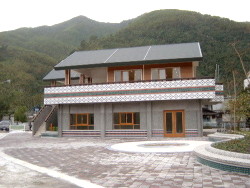An Opportunity to Realize the Digital Dream

Realizing a Digital Dream for Townships
Since the program began in 2005, the government has been working tirelessly to create a convenient digital environment for citizens in remote townships. 54 DOC's (Digital Opportunity Centers) have been established in 14 counties and the estimated total at the completion of the project is 113 DOC's, which will cover all the remote townships in Taiwan. The program provides hardware and training for assisting the locals to learn the digital tricks of the trade and helping to develop the local industries, in addition to sending volunteers that are committed to the effort of developing local DOC's.
The MOE held an opening ceremony for the "Opening for the Newly Established DOC" today (1/25/2008) at San Jhan Community, Siou Lin Township, Hualian County. Minister Du, Hsieh Shen-Shan, the Magistrate of Hualian County, and Huang Wen-Shu, the dean of National Dong Hwa University, participated via online conferencing with DOC's from 14 counties to celebrate a new milestone in expanding the digital opportunities for remote townships.
The goal of the establishment of DOC is integrating the digital environment with the livelihood or industries of the local communities and in term raise the locals' abilities to utilize digital information. At San Jhan Community, where the Siou Lin DOC is located, plans have been made for spreading the message about the promotional activities made by Buladan Eco-tourism Center for River trekking through the Golden Canyon, a walk through the Eco-River trekking pathway, and a tour of aborigine tribes such as the Taroko Tribe, through DOC, in order to promote the local eco-travel and leisure industry and raise the abilities of the locals in using digital information to their maximum advantage.
Limitless Opportunities for Remote Townships Digitally
As stressed by Chang Jun-Hsiung, the Premier of the Executive Yuan: "One of the biggest focuses for the government has been to provide equal opportunities for citizens in remote areas or disadvantaged groups so that all can enjoy the fruits of technological advancement and public service provided by the government without any discrimination based on location."
The establishment of DOCs serves not only the government for reducing the digital divide between cities and townships but also the residents in communities for accomplishing their dreams. "In the past, falling victim to the limits of space, time, or the lack of talents, the people in the townships had a difficult time catching up to the people in cities when it came to applying digital information to living, learning, and working. With help from DOC's, the residents in remote townships are now in a digital environment where they can receive job training, after school activities for students and industrial development aid, and that's not all," Yang Jen-Hon, Section Chief of the Computer Center of MOE said. "But the competitiveness of industries is raised because the passing of information among cities and remote areas has become easy."
Breaking Geographical Limitations Using Network Technology
In the 4th year of the "Bridging Digital Divide in Rural Area Project", the government received complete public support, in addition to consolidating resources from community and volunteer groups, enterprises and non-profit organizations, toward achieving the goal of e-communities for remote areas. With the MOE in charge, 113 DOCs have been established in 98 remote townships in areas including Peng Hu, Jin-Men, and Lian-Jiang County, and solid benefits have been reaped from the application of e-information.
Demonstrating Our Commitment to Equal E-Opportunities for All the World
According to the "The World Information Society Report 2007" submitted by ITU of United Nations, Taiwan's ranking on the "e-opportunity" list improved from 10th place to 7th place. That adequately shows the successful efforts of our government in reducing the digital divide between cities and remote areas in Taiwan.
The Executive Yuan plans to invest NT$ 4.027 billion in 2008 to 2011 in its effort to continue the "Bridging Digital Divide in Rural Area Project". We believe that by combining the strengths of governmental departments and non-profit organizations we can create an e-environment where everyone, including the disadvantaged and those who live in remote areas, can equally enjoy the conveniences of an e-society.
Attachment(s) for download
- Chinese textChinese text.doc
